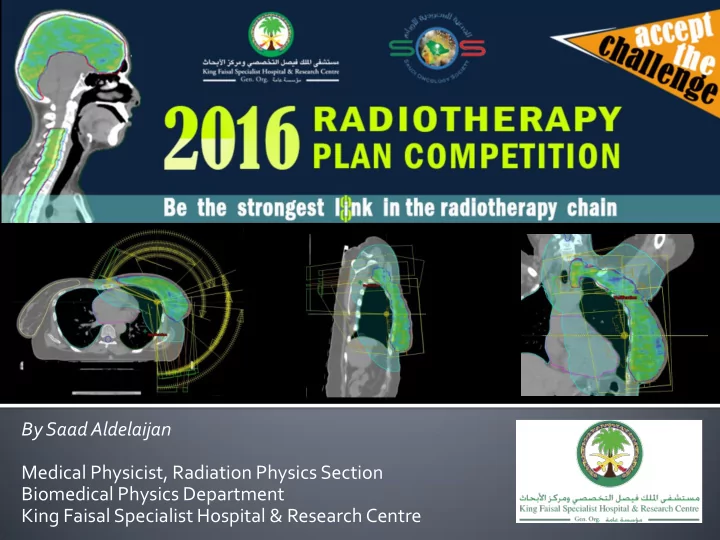

By Saad Aldelaijan Medical Physicist, Radiation Physics Section Biomedical Physics Department King Faisal Specialist Hospital & Research Centre
About the competition Contouring stage Arc geometry Optimization Results Conclusions
Case selection Peripheral targets Inhomogeneous shape Proximity to organs at risk The criteria In general, the criteria is well chosen Constraints on the right side of the patient were difficult to achieve I found that some objectives were easily “over” achieved
Structure Points Target (CI , HI, others) 45 Heart 20 Left lung 19 Right breast 6 Right lung 5 Spinal cord 5 Total: 100
Intensity modulators: MLC Speed (Max speed 2.5 cm/sec) Dose Rate (0-1400 MU/min) Gantry Speed (~4.8 deg/sec)
Made the structures “high resolution” Used partially segmented OARs Used conformation structures (rings)
Eclipse Ver 13.6 (AAA 11.0.31, TrueBeam) Limitations: Target inhomogeneity multiple field sizes per target Sparing ipsilateral OARs isocentre positioning Sparing contralateral OAR’s limiting gantry rotation MLC over-carriage max travel of 14.5 cm Therefore, I used all available assets (nine coplanar partial arcs) @ 6 MV FFF
290 130 CW Gantry Collimator 5 deg
119 330 CCW Gantry Collimator 355 deg
290 45 CW Gantry Collimator 5 deg
179 70 CCW Gantry Collimator 355 deg
295 75 CW Gantry Collimator 5 deg
75 295 CCW Gantry Collimator 5 deg
82 170 CW Gantry Collimator 355 deg
170 82 CCW Gantry Collimator 355 deg
179 95 CCW Gantry Collimator 355 deg
Start with targets and rings only: SC + SC ring + overall ring add axilla add breast add OARs Try to be patient!
Pause the optimizer until the cost function “plateaus” At the “odd number” steps At the beginning of each phase (calc resolution) Re-optimize: using the current plan dose as an intermediate dose for optimization
If your target priorities are P: 100% Lt Lung: ▪ 95 % 15 % vol max: 2000 cGy ▪ 80% mean: 700 cGy Rt Lung: ▪ 80 % 3 % vol max: 500 cGy ▪ 50% mean: 100 cGy Rt Breast: ▪ 90 % 5 % vol max: 200 cGy ▪ 50% mean: 75 cGy Heart: ▪ 35% mean: 400 cGy Spinal cord: ▪ 40% 0% vol max: 600 cGy ▪ 40% mean: 150 cGy
PTV L Lung Spinal Cord R Lung Heart R Brst
Structure Min dose (cGy) Max dose (cGy) Mean dose (cGy) PTV_TOTAL_EVAL 3868.8 5579.6 5118.7 Heart 48.9 4931.7 388.5 Left lung 69.2 5228.1 973.5 Right breast 0.0 847.9 47 5.0 2363.0 103.7 Right lung Spinal cord 22.2 895.6 139.1
Structure Available Points My score Targets (coverage, conformation, 45 42.43 homogeneity, hotspot) Heart 20 20 Left lung 19 17.62 Right breast 6 3.54 Right lung 5 5 Spinal cord 5 5 Total: 100 93.6
General: Understand the criteria to score more Make a quick table for points/organ Contouring: Use high resolution structures Use conformation structures (rings) Use partially segmented structures for increased OARs sparing Geometry: Nine coplanar partial arcs @ 6 MV FFF SC (2), Axilla (2), Breast (4) and (1 ) “overall” Optimization: Start with SC+rings , add axilla, add breast, then the rest Try to be patient!
Recommend
More recommend